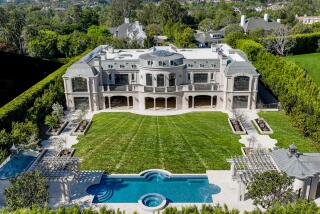He Is Worlds Apart From His Job : Government: Gary Bedian of Van Nuys is deputy minister of industry for Armenia. He’s trying to attract foreign investment.
REGION — Van Nuys property manager Gary Bedian’s first mission as Armenia’s deputy minister of industry was a dirty business.
Literally. It was 9:30 a.m. in Yerevan and Bedian was helping to install a water heater in a no-comforts hotel in the Armenian capital so a potential investor could enjoy the luxury of a hot shower, a rarity in the former Soviet republic.
“I’m not a plumber, but I’ll do anything it takes to help Armenia,” said Bedian in his Sherman Oaks commercial real estate office. “It’s important to try to minimize all the pain and discomfort for the investors.”
Bedian, 32, is one of at least two dozen Americans named to government posts in young republics that have emerged since the unraveling of the Soviet Union and Eastern Bloc nations. At the highest levels are Costa Mesa pharmaceuticals executive Milan Panic, who was appointed prime minister of war-torn Yugoslavia, and Armenian Foreign Minister Raffi Hovannisian, a Brentwood attorney. Both have moved abroad.
At least 10 other Americans--including Bedian--continue to live in the United States while filling lower-level government posts in Armenia, which won its independence last fall after seven decades of Soviet domination.
“Armenia is reaching out all over the world for the best and brightest” of Armenian ancestry, said Carol Karabashian, a spokeswoman for the Armenian Embassy. The recruitment makes sense, she said, because more than half of the about 6 million ethnic Armenians live outside the tiny country as the result of a diaspora that dates to a series of bloody conflicts with Turkey from the 1890s through the end of World War I. About 250,000 ethnic Armenians live in the Los Angeles area.
An American citizen of Armenian ancestry who was born in Syria, Bedian says that helping Armenia recruit foreign investors and living in Southern California is like “having two wives or a split personality.”
“I would die for the U.S. any day if there was a need to,” said Bedian, a portly man with large brown eyes, who wears a lapel pin depicting crossed Armenian and American flags. “But this is a once-in-a-lifetime opportunity to do something for my ancestors’ homeland.”
The first time Bedian visited Armenia was in 1991, when he went to a convention initiated because of the Soviet policy of perestroika, or restructuring of the economy before independence. “It was the most emotional period of my life,” he said. “I got off the plane in tears and I didn’t stop crying for the whole 10 days.”
“If we don’t help these countries now, we will pay for it one way or another, either in additional aid or increased instability and violence.”
Bedian’s role in the Armenian government presents no legal conflict with his continued American citizenship because he was not required to take an oath of loyalty or become an Armenian citizen, said an Armenian specialist with the U.S. State Department who asked not to be identified.
“What they’re doing is similar to the role American Jews played in helping Israel,” the specialist said.
“He’s basically a matchmaker” between foreign investors and Armenia, whose economy is in dire straits, said Edward Lazear, a senior fellow with the Hoover Institute, a conservative think tank based at Stanford University. Lazear was appointed a foreign member of the Supreme Economic Council of Russia and is trying to find Western businesses interested in investing in the coal industry there.
“The reality is, those places are so poor right now they’re not in a position to be a threat to the United States,” either economically or militarily, Lazear said.
Even before he was appointed to the post last month, Bedian, who speaks English, Turkish, Arabic and Armenian, was using his business contacts to help attract foreign investment.
Far from profiting from the job, Bedian says, he is subsidizing the Armenian government. His official salary is only 3,000 rubles a month--about $13--and it costs him $2,000 per trip to fly to Armenia. He has made the two-day flight 11 times in 18 months at his own expense.
“A lot of it is on credit cards,” said Bedian’s wife, Hourig, 31. “But it is for our motherland.”
Bedian’s task is “a tall order” because Armenia, a land-locked nation the size of Switzerland, has few resources besides a well-educated labor force, the State Department official said. The country is enmeshed in a territorial war with neighboring Azerbaijan and is experiencing a severe grain shortage because of a blockade in strife-ridden Georgia to the north.
“American or French Armenians might want to sink a few (thousand dollars) into the country for sentimental reasons, but it’s extremely risky,” the official said.
Bedian, who says he has neglected his real estate business to work for Armenia, scoffs at such warnings. He touts the economic advantages of investing in the country, citing a nearly completed, $120-million computer parts factory built by the Soviets as a low-cost investment for someone with $10 million to spare.
Among his major successes was getting Pacific Hotels Associates of Santa Monica to agree to help build a $12-million trade center and two much-needed hotels in Yerevan. The hotels, scheduled to open next fall, will have Western amenities such as room service and hot water, sparing Bedian the necessity of doubling as a plumber in the future. (The Lebanese investor who got to take a hot shower at the Yerevan no-comforts hotel is on the brink of signing a contract to provide a new telephone system for the republic, Bedian said.)
But Bedian acknowledges that talking businesses into investing in Armenia is not an easy task. Bedian vows he will persevere. Armenia, he says, is like the souvenir watch he hands out to investors. Made in Russia, the hefty watch bears the words “Free and Independent Armenia” and features a picture of Mt. Ararat, a national symbol where the Bible says Noah’s Ark landed after the great flood (although the mountain is in Turkey, outside modern Armenia.)
The old-fashioned watch has to be wound daily, but “it’s indestructible,” Bedian said, “just like Armenia.”
More to Read
Inside the business of entertainment
The Wide Shot brings you news, analysis and insights on everything from streaming wars to production — and what it all means for the future.
You may occasionally receive promotional content from the Los Angeles Times.










